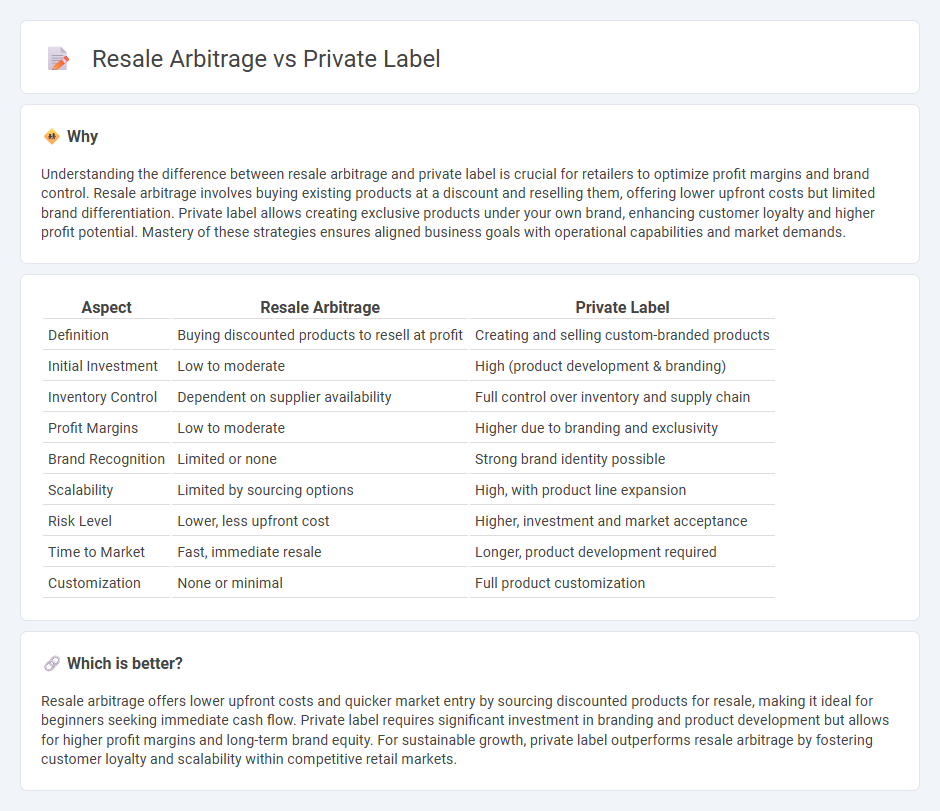
Resale arbitrage leverages buying discounted or clearance products from retail stores to sell at a higher price online, capitalizing on existing brand recognition and demand. Private label involves creating and branding custom products, allowing greater control over pricing, marketing, and differentiation in competitive markets. Discover how these strategies impact retail margins and scalability.
Why it is important
Understanding the difference between resale arbitrage and private label is crucial for retailers to optimize profit margins and brand control. Resale arbitrage involves buying existing products at a discount and reselling them, offering lower upfront costs but limited brand differentiation. Private label allows creating exclusive products under your own brand, enhancing customer loyalty and higher profit potential. Mastery of these strategies ensures aligned business goals with operational capabilities and market demands.
Comparison Table
| Aspect | Resale Arbitrage | Private Label |
|---|---|---|
| Definition | Buying discounted products to resell at profit | Creating and selling custom-branded products |
| Initial Investment | Low to moderate | High (product development & branding) |
| Inventory Control | Dependent on supplier availability | Full control over inventory and supply chain |
| Profit Margins | Low to moderate | Higher due to branding and exclusivity |
| Brand Recognition | Limited or none | Strong brand identity possible |
| Scalability | Limited by sourcing options | High, with product line expansion |
| Risk Level | Lower, less upfront cost | Higher, investment and market acceptance |
| Time to Market | Fast, immediate resale | Longer, product development required |
| Customization | None or minimal | Full product customization |
Which is better?
Resale arbitrage offers lower upfront costs and quicker market entry by sourcing discounted products for resale, making it ideal for beginners seeking immediate cash flow. Private label requires significant investment in branding and product development but allows for higher profit margins and long-term brand equity. For sustainable growth, private label outperforms resale arbitrage by fostering customer loyalty and scalability within competitive retail markets.
Connection
Resale arbitrage and private label strategies both focus on leveraging product sourcing and market demand to maximize retail profits. Resale arbitrage involves purchasing discounted or clearance products and reselling them at a higher price, while private label entails creating and branding unique products to establish direct market control. Retailers often use resale arbitrage insights to identify trending products, which informs the development of private label items tailored to customer preferences and competitive advantages.
Key Terms
Branding
Private label emphasizes creating unique products under your own brand, allowing full control over branding, packaging, and customer experience, which helps build long-term brand equity and customer loyalty. Resale arbitrage involves purchasing existing products from other brands at a discount and reselling them with minimal modification, offering quick profits but limited branding opportunities. Explore more about how these strategies impact your brand growth and business scalability.
Profit Margins
Private label products typically yield higher profit margins by allowing sellers to control branding and pricing, reducing competition and increasing customer loyalty. Resale arbitrage involves purchasing items at a discount and reselling them for a markup, but profit margins tend to be thinner due to market competition and sourcing challenges. Discover more about optimizing profit strategies through private label and resale arbitrage approaches.
Supply Chain
Private label products require direct control over the supply chain, including sourcing raw materials, manufacturing, quality control, and branding, which allows for greater customization and profit margins. Resale arbitrage relies on purchasing existing retail products at a discount and selling them with limited supply chain involvement, often facing inventory risks and dependency on third-party availability. Explore the critical supply chain differences further to optimize your e-commerce strategy.
Source and External Links
Private label - A private label is a brand owned by a company and used to market products made by another company, often exclusively sold by the owner company, and distinct from white-label products which are more generic.
What Is a Private Label? How Private Labels Work in 2025 - Private labeling is when a retailer brands and sells a product made by a third-party manufacturer, specifying unique product features, and it allows retailers to offer exclusive products and control branding.
40+ Private-Label Products To Sell in 2025 - Starting a private-label brand involves legal considerations like product compliance, intellectual property protection, product liability coverage, accurate labeling, and carefully crafted supplier agreements to safeguard your business.
 dowidth.com
dowidth.com